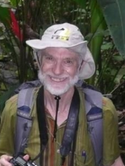NIMBioS Seminar Series
In conjunction with the interdisciplinary activities of the National Institute for Mathematical and Biological Synthesis (NIMBioS), a seminar series on topics in mathematical biology will be hosted at NIMBioS every other Tuesday at 3:30 p.m. (unless otherwise noted) in the Hallam Auditorium, Room 206, Claxton Building, 1122 Volunteer Blvd. Seminar speakers will focus on their research initiatives at the interface of mathematics and many areas of the life sciences. Light refreshments will be served in Room 205 beginning 30 minutes before each talk. Faculty and students from across the UT community are welcome to join us.
Speaker:
Dr. Peter Chesson, Ecology and Evolutionary Biology, Univ. of Arizona, and NIMBioS Postdoctoral Fellows Invited Distinguished Visitor
Time/Date: Tuesday, March 8, 2016, 3:30*
Location:
Room 206, Claxton Building, 1122 Volunteer Blvd.
Topic:
Diversity maintenance: New concepts and theory for communities as multiple-scale entities
Abstract:
Current approaches to community assembly, species coexistence, and the maintenance of biodiversity focus on the coexistence of species on small areas of habitat, which are assumed to support self-sustaining biological communities. The local communities on these areas are assumed to be assembled from the regional set of species according to local environmental conditions and interactions between species. However, local communities are not natural ecological entities in most cases, but are defined more by convenience for study. In general, local communities are affected by immigration on ecological time scales, and so do not satisfy the requirements for most theories of coexistence and diversity maintenance. For any given unit of space on a given scale, scale transition theory reveals how much diversity can be explained by processes taking place within that unit of space compared with contributions from other spatial units or other scales. I use scale transition theory to show how the joint contributions of multiple mechanisms of coexistence can be studied. These mechanisms include point mechanisms, such as resource partitioning, spatial mechanisms such as the spatial storage effect and fitness-density covariance, and temporal mechanisms such as the temporal storage effect. This multi-scale community theory removes the artificial distinction between the local community and the species pool. Instead, it shows how the species pool and the local community are mutually dependent, with scale-dependent properties. The measures of mechanism strength from scale transition theory can be operationalized for field and experimental studies, and provide rigorous approaches to the study of coexistence in natural communities as multiple scale entities.
Peter Chesson is a Professor of Ecology and Evolutionary Biology at the University of Arizona and is Editor of Theoretical Population Biology. He currently also maintains a visiting professorship at National Chung Hsing University, Taiwan. He studies community ecology theory, empirical plant community ecology, and plant structure and function. His theoretical work has emphasized theory for community dynamics and species coexistence in spatially and temporally varying environments. His more recent work has focused on multitrophic diversity maintenance theory, nonstationary environments, and multiscale diversity maintenance theory. He has also worked on theory for biological invasions and the evolution of species coexistence mechanisms.
*Join us for refreshments at 3 p.m.
Seminar Flyer (pdf)
![]() Live Stream.
Unless otherwise noted, NIMBioS seminars are streamed live.
To view the live stream, visit /videos/livestream.
Join the live chat of the seminar via Twitter (#nimbios), which is displayed to the right of the live stream
We encourage you to post questions/comments and engage in discussion with respect to our Social Media Guidelines.
Live-streamed seminars are archived for later viewing on NIMBioS' YouTube channel.
Live Stream.
Unless otherwise noted, NIMBioS seminars are streamed live.
To view the live stream, visit /videos/livestream.
Join the live chat of the seminar via Twitter (#nimbios), which is displayed to the right of the live stream
We encourage you to post questions/comments and engage in discussion with respect to our Social Media Guidelines.
Live-streamed seminars are archived for later viewing on NIMBioS' YouTube channel.
For more information about this and other NIMBioS Seminars, visit /seminars.
NIMBioS
1122 Volunteer Blvd., Suite 106
University of Tennessee
Knoxville,
TN 37996-3410
PH: (865) 974-9334
FAX: (865) 974-9461
Contact NIMBioS



